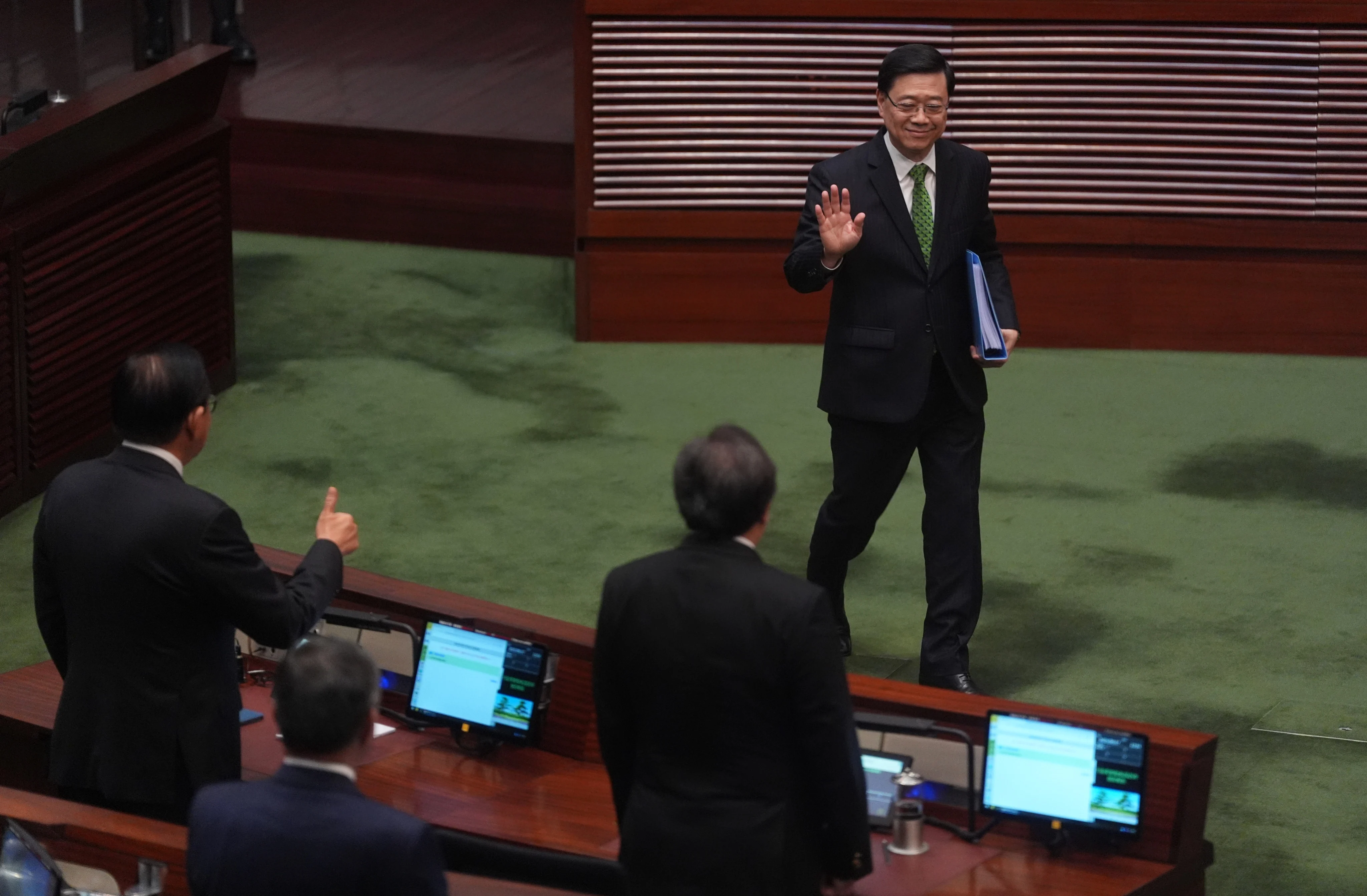By Jeffie Lam
Copyright scmp

Hong Kong’s leader has delivered a comprehensive policy blueprint pushing for further economic reforms by expediting key infrastructure projects and doubling down on the city’s competitive strengths, while also improving livelihoods, notably charting more paths to home ownership.
In a wide-ranging speech that left no stone unturned, Chief Executive John Lee Ka-chiu vowed to entice more high value-added industries and enterprises to the city by offering preferential policy packages. For the first time, he also floated the idea of settling government expenditure in renminbi.
He cited the improvement of people’s livelihoods as the “ultimate objective” in his more accountable governance, promised to develop artificial intelligence as a core industry, and undertook to personally lead the fast-tracked development of the Northern Metropolis.
And signalling responsiveness in light of a recent scandal, he announced a new no-nonsense accountability mechanism for senior civil servants.
“We are moving through an irreversible economic transition, but it is an essential process for a stronger and more robust economy in the future,” Lee declared in his fourth policy address before the legislature on Wednesday.
“These transformations were possible because generations of Hong Kong people have worked hard, stayed flexible and never given up. That grit is part of our DNA, and it will continue to be the engine that drives us forward.”
This year’s blueprint, titled “Deepening reforms for our people, leveraging our strengths for a brighter future”, was Lee’s second last, leaving him with just two years to deliver his pledges before his first term ends in 2027.
As a key plank of his economic reform agenda, Lee will lead a committee to streamline administrative workflows and remove unnecessary barriers and restrictions in the development of the Northern Metropolis.
The megaproject aims to turn 30,000 hectares (74,132 acres) of land near the city’s border with mainland China into an engine for economic growth and a housing hub.
He revealed that authorities would introduce dedicated legislation which, among other things, will empower the government to devise simplified statutory procedures.
These could range from the setting up of statutory industry park companies and providing them with dedicated channels for funding, as well as managing the cross-boundary flow of people, capital, data and biological samples in designated areas.
An insider said the new law would mean that certain funding for the project would no longer require the legislature’s prior approval.
But Lee insisted that removing barriers in the Northern Metropolis was not to make it a “special administrative zone” within the city.
A dedicated law would help accelerate the development of the Northern Metropolis, but “that is not to say robbery will not be a crime inside the metropolis”, he stressed.
He made plain the whole project would not be handed over to just one company. “Imagine we are handing over one-third of Hong Kong’s land to one company. Our policy aims to encourage competition,” Lee said.
Lee also sought to leverage the city’s unique edges to consolidate its status as an international financial centre.
The stock market, he said, would be strengthened through moves to assist mainland technology enterprises in raising funds and encourage more overseas enterprises to seek secondary listings in the city. Mainland banks will also be encouraged to set up regional headquarters in the city.
The government would establish a central clearing system for gold in Hong Kong and, for the first time, was considering using renminbi to settle government expenditure under “suitable circumstances” in Hong Kong, the world’s largest offshore yuan settlement hub.
To turn the city into an international education hub, Lee said the government would accelerate construction of the Northern Metropolis University Town and raise the non-local undergraduate quota at public universities from 40 to 50 per cent of that of the local intake from the next academic year.
It will expand the “Study in Hong Kong” brand to cover primary and secondary sections by allowing semi-private schools under the Direct Subsidy Scheme to enrol more self-funded overseas students.
On governance, Lee introduced a Heads of Department Accountability System to better hold underperforming senior civil servants accountable a month after a water procurement scandal unfolded.
The Government Logistics Department was found to have awarded a three-year HK$52.9 million (US$6.8 million) contract to a company that allegedly used fraudulent documents.
Those held responsible following investigations would be subject to anything from warnings to demotions and pay cuts to compulsory retirement and dismissal.
Dismissing fears the new system could hit morale and lead to an exodus of senior officials, Lee held firm: “If [they] think like that, [they] had better go.”
The city leader also sought to show his government was responsive to residents’ feedback, as he spelled out new measures to prevent abuse of a scheme allowing employers to import workers in certain fields.
Unions had protested that some restaurants were found to have sacked local employees and used cheaper, imported workers.
From Thursday onwards, Lee said, employers seeking to hire imported waiters and junior cooks must extend the local recruitment process from the current four weeks to six weeks and must also take part in on-site job fairs by the Labour Department once a week.
To improve people’s livelihoods and boost their “sense of happiness and well-being”, Lee announced measures to increase the subsidised housing supply and strengthen the housing ladder to home ownership.
The measures included providing more quotas for public rental housing tenants in purchasing subsidised flats, increasing opportunities for people in the private rental market to buy lived-in subsidised homes and building bigger subsidised homes for sale.
Lee also promised to strengthen support for those in need, spending HK$500 million each year on recurrent expenditures to support carers, including establishing a high-risk family database and installing accident detection systems.
In a commentary under the pen name of “Gang Ao Ping”, Beijing’s Hong Kong and Macau Affairs Office hailed the policy address for demonstrating the enterprising spirit of Lee and his team in shouldering primary responsibility for the city’s governance.
Citing Lee’s plans to establish the new committee to speed up the Northern Metropolis as well as the new accountability system, the office said it showed his determination and will to reform.
New People’s Party lawmaker Regina Ip Lau Suk-yee, convenor of the government’s key decision-making Executive Council, described Lee’s blueprint as comprehensive in uplifting the economy and improving livelihoods
She said his move to oversee the Northern Metropolis project personally was a “breakthrough” which could help the city’s economic transformation.
Billy Mak Sui-choi, associate professor at Baptist University’s department of accountancy, economics and finance, said it was good to develop Hong Kong as an international gold trading centre.
“From the perspective of central banks, many realise there were some obstacles in taking their gold stored in the US, which would prompt them to wonder whether it’s the safest to have gold stored there,” he said, suggesting Hong Kong was an ideal place for it given that it is free of foreign exchange restrictions.
He said while Lee’s new measures would help protect local workers, more needed to be done to tackle the dire straits of the food and beverage industry. [print cut]
In appealing to residents to push Hong Kong further, Lee summed up his call thus: “We must not be complacent, nor should we underestimate our own capabilities.”
Additional reporting by Ng Kang-chung and Ambrose Li



